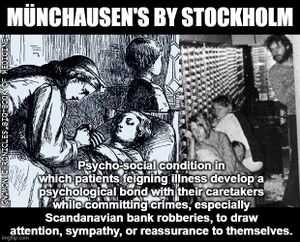Münchausen's by Stockholm: Difference between revisions
No edit summary |
No edit summary |
||
| Line 12: | Line 12: | ||
<gallery> | <gallery> | ||
File:The Life Erotic with Steve Zissou.jpg|link=The Life Erotic with Steve Zissou|"'''[[The Life Erotic with Steve Zissou]]'''" is a research paper on human behavior conducted by [REDACTED] and funded by the Greater Sol System Co-Prosperity Sphere. | |||
File:Playskool's My First DSM (GEBD).jpg|link=Good-Evil bipolar disorder|In Dungeons & Dragons, '''[[Good-Evil bipolar disorder]]''' ('''GEBD''') is a mental disorder characterized by periods of loyal service to the Good and periods of abnormally Evil mood that last from days to weeks each. | File:Playskool's My First DSM (GEBD).jpg|link=Good-Evil bipolar disorder|In Dungeons & Dragons, '''[[Good-Evil bipolar disorder]]''' ('''GEBD''') is a mental disorder characterized by periods of loyal service to the Good and periods of abnormally Evil mood that last from days to weeks each. | ||
| Line 28: | Line 30: | ||
* [[Playskool's My First Nuclear DSM]] | * [[Playskool's My First Nuclear DSM]] | ||
* [[Scrimshaw abuse]] | * [[Scrimshaw abuse]] | ||
* [[The Life Erotic with Steve Zissou]] | |||
* [[Transdimensional corporation]] | * [[Transdimensional corporation]] | ||
Revision as of 10:55, 5 July 2021
Münchausen's by Stockholm is a psycho-social condition in which patients feigning illness develop a psychological bond with their caretakers while committing crimes, especially Scandanavian bank robbery, to draw attention, sympathy, or reassurance to themselves.
Description
Emotional bonds may be formed between patients and captives, during intimate crimes together, but these are generally considered legally non-actionable in light of the danger or risk endured by the patients.
Münchausen's by Stockholm fits within the subclass of factitious crime disorder with predominantly transdimensional signs and symptoms, but patients also have a history of recurrent imprisonment, escape, and dramatic, extremely improbable tales of their past experiences.
The condition derives its name from the legendary physician-bandit Baron Munchausen.
In the News
"The Life Erotic with Steve Zissou" is a research paper on human behavior conducted by [REDACTED] and funded by the Greater Sol System Co-Prosperity Sphere.
In Dungeons & Dragons, Good-Evil bipolar disorder (GEBD) is a mental disorder characterized by periods of loyal service to the Good and periods of abnormally Evil mood that last from days to weeks each.
"Cognitive-Behavioral Therapy For Adult Airplane Disorders: A Meta-analysis Of Randomized Placebo-controlled Airshows" is a research paper published by Playskool's My First DSM.
1967: Playskool's My First DSM correlates Scrimshaw abuse with Münchausen's by Stockholm.
Fiction cross-reference
- Cognitive-Behavioral Therapy For Adult Airplane Disorders
- EL-CACZ - battle cry of the Uncials, a transdimensional street gang
- Gnomon algorithm
- Gnomon Chronicles
- Playskool's My First Nuclear DSM
- Scrimshaw abuse
- The Life Erotic with Steve Zissou
- Transdimensional corporation

!["The Life Erotic with Steve Zissou" is a research paper on human behavior conducted by [REDACTED] and funded by the Greater Sol System Co-Prosperity Sphere.](/w/images/thumb/6/6f/The_Life_Erotic_with_Steve_Zissou.jpg/120px-The_Life_Erotic_with_Steve_Zissou.jpg)


